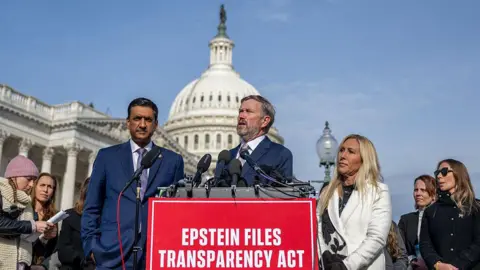 Getty Images
Getty ImagesBoth houses of Congress have agreed to force the US Department of Justice to release materials on financier and sex offender Jeffrey Epstein.
The House overwhelmingly approved the measure, 427 to 1, and the Senate unanimously fast-tracked its passage without a formal vote.
The moves come just days after President Donald Trump reversed his position and called on Congress to vote on releasing the records after public opposition from many of his supporters.
Trump and his ties to Epstein were back in the headlines last week after more than 20,000 pages of documents, some of which mentioned the president, were released. The White House denies any wrongdoing.
Republican Clay Higgins of Louisiana was the lone dissent in the House and expressed concern that “innocent people would suffer” as a result of the information being released.
Trump's shift from attacking those on Capitol Hill who wanted to release the files to saying there was “nothing to hide” surprised some in Washington.
Republican congressional leadership was caught off guard after spending the last few weeks coordinating its message with the president and opposing the release.
House Speaker Mike Johnson has repeatedly called the attempt to release Epstein's files a “Democratic hoax.”
On Tuesday, he voted for release.
The measure was expected to take days to pass in the U.S. Senate, but the timeline quickly accelerated after a high-profile afternoon vote in the House.
Senate Minority Leader Chuck Schumer brought the bill to the Senate floor under a procedure called unanimous consent. Since no one objected, there was no debate and no amendments were made to the bill.
It will head from the Senate to the president's desk, where he is expected to sign it.
A vote in Congress was not required to release the files; Trump could order the release himself.
The bill would require Attorney General Pam Bondi to release “all unclassified records, documents, communications and investigative materials” related to Epstein and his accomplice Ghislaine Maxwell no later than 30 days after the law takes effect.
The material includes internal Justice Department communications, flight logs, and people and organizations associated with Epstein.
But the bill also gives Bondi the power to withhold information that could jeopardize any active federal investigation or identify victims.
Epstein, a financier, was found dead in his New York City prison cell in 2019 in what a coroner ruled was a suicide.
He was in custody on charges of sex trafficking and was previously convicted in 2008 of soliciting prostitution of a minor.
The two criminal investigations into Epstein produced thousands of documents, including transcripts of interviews with victims and witnesses.
Trump and Epstein previously hung out in similar circles, but the president said he cut ties with Epstein years ago, even before his 2008 conviction. The president also said he had no knowledge of Epstein's criminal activities.
Last week, Democrats on the House Oversight Committee released three email chains, including correspondence between Epstein and Maxwell, who is currently serving a 20-year prison sentence for sex trafficking.
Some of them mention Trump, including one email sent in 2011 in which Epstein wrote to Maxwell: “I want you to understand that the dog that didn't bark is Trump. [VICTIM] I spent hours with him in my house.”
The White House said last week that the victim mentioned in the email was prominent Epstein accuser Virginia Giuffre.
Giuffre, who died in April, said she never saw Trump engage in any abuse and there was no suggestion in the emails of any wrongdoing on Trump's part.
Speaking after the vote, Giuffre's brother Skye Roberts praised her sister's role in seeking justice for Epstein survivors.
“She did it, she paved the way… She paved the way for us to step up as advocates, for her surviving sisters to step forward, and we won't stop,” Roberts said.
Trump has consistently denied any wrongdoing against Epstein. White House press secretary Caroline Leavitt said the emails were “selectively shared” by House Democrats “with liberal media outlets to create a false story to smear President Trump.”
The push to release investigative records held by the Justice Department was led by Republican Thomas Massie, a Kentucky congressman who sometimes disagrees with his party, and Democrat Ro Khanna, a California congressman, both of whom introduced the legislation.
Massie was criticized by Trump for his push to release the files, but he stood his ground.
“He won't be president in 2030,” Massey told ABC News over the weekend. He added that fellow Republicans who voted against the release would “vote to protect pedophiles.”
Another Republican who has pushed for the files to be released is House Representative Marjorie Taylor Greene. She was a staunch Trump supporter before they fell out over the issue, and now the president has called her a “traitor.”
At a news conference earlier in the day on Tuesday, Greene said she was speaking out on behalf of survivors of Epstein's murder. She also addressed Trump directly.
“Let me tell you what a traitor is. A traitor is an American who serves other countries and himself; a patriot is an American who serves the United States of America and Americans like the women behind me,” Greene said.
She said the Epstein controversy was one of the “most damaging events” for Trump's Make America Great Again movement since his election in 2016.
Survivors of Epstein's abuse also spoke at the news conference, calling on lawmakers to release the files and urging Trump to do the same.
Annie Farmer, an Epstein survivor, said keeping the files secret amounted to “institutional betrayal.”
“Because these crimes were not properly investigated, many more girls and women were harmed,” Ms Farmer said.








